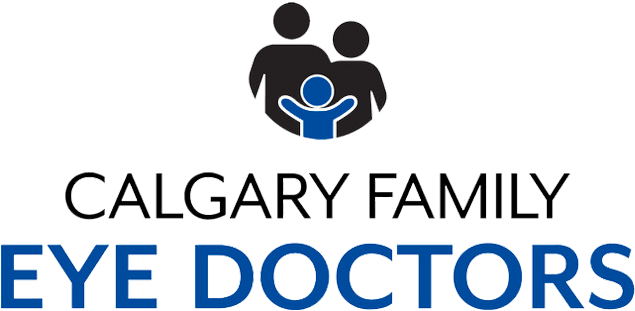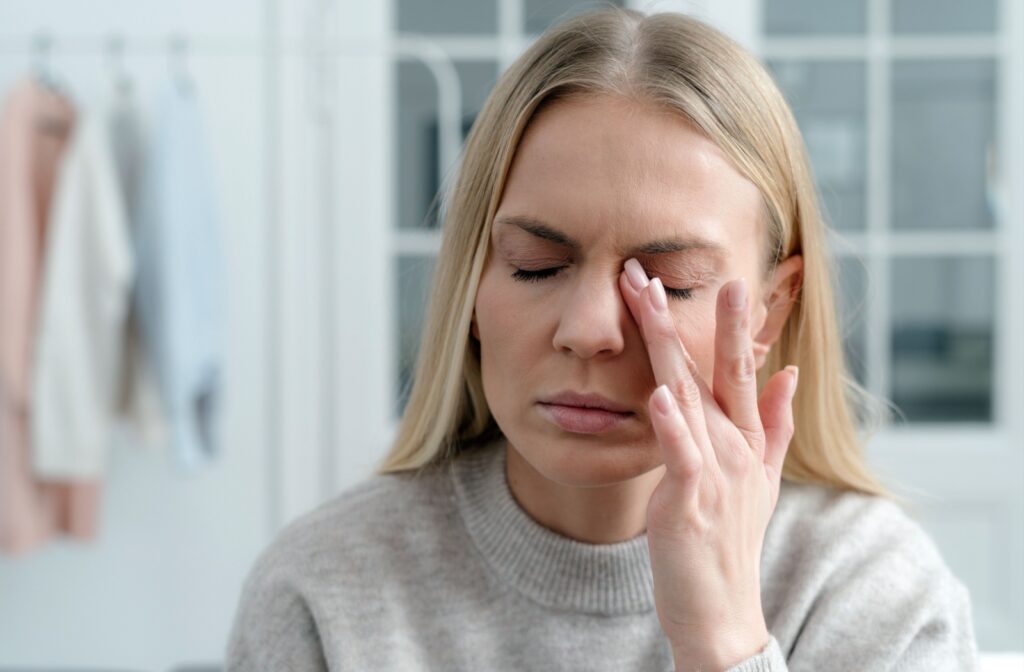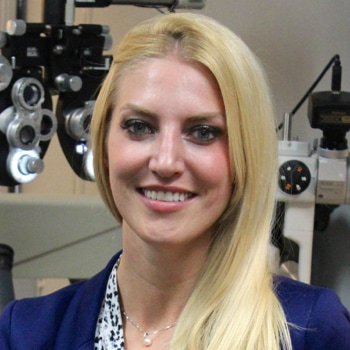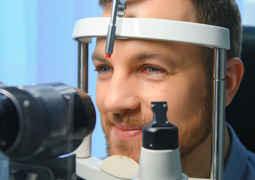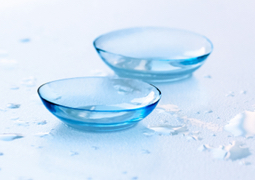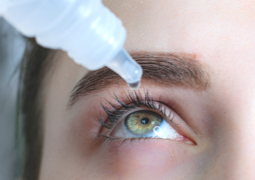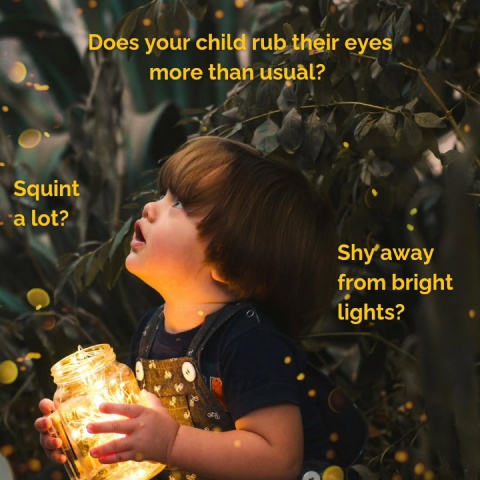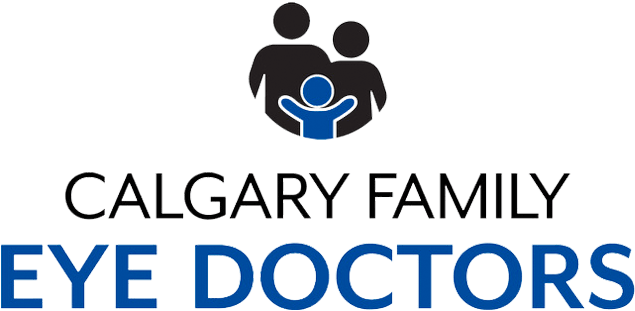Waking up with dry eyes can be more than just a minor annoyance. It’s a frustrating experience that affects your entire day, leaving you to wonder what went wrong. With constant irritation, burning sensations, blurry vision, and more, waking up with dry eyes is an easy way to start the day off on the wrong foot.
Typically, dry eyes in the morning are caused by an imbalance in your tear film. This can develop due to environmental factors, poor sleep quality, allergies, and even underlying medical conditions. If you constantly wake up with dry eyes, visit your optometrist to discuss treatment—it’s the key to finding relief.
What Causes Dry Eyes?
The tear film’s purpose is to keep your eyes lubricated, nourished, and free from contaminating particles. It consists of three layers—an oily layer, a watery layer, and a mucus layer—that work together to maintain eye health and comfort.
However, when there’s an imbalance in any of these layers, your eyes are unprotected. Instead of being shielded, they’re easily irritated and inflamed. This causes a constant burning sensation, almost as though there’s sand trapped in your eye. This is a condition called “dry eyes.”
The Symptoms of Dry Eye
Dry eye isn’t just a temporary problem. It leaves your eyes exposed and easily damaged, which can cause permanent damage if you’re not careful. Recognizing the early signs of dry eyes is crucial, so keep an eye out for:
- Redness
- Burning or stinging sensation
- Blurred vision
- Sensitivity to light
- Watery eyes (a reflex to dryness)
If these sound familiar, talk to your optometrist to discuss potential solutions.
Dry Eyes in the Morning
Waking up with dry eyes can be particularly frustrating, but understanding the cause is the first step to finding relief. One common issue is simple—not getting enough sleep. While sleeping, your eyes regenerate and repair from the day’s damage.
If you’re not getting enough rest, your eyes aren’t fully healing, and this can lead to dryness and irritation in the morning. This becomes much more of a problem if your eyes don’t close fully while you sleep, a common problem called nocturnal lagophthalmos. And if you frequently deal with allergies, these can set off dry eye symptoms and cause frustration when you wake.
Dry Eyes at Night
If you deal with dry eyes at night as well as in the morning, take a moment to consider your sleep habits. These could be the cause of your symptoms.
Ideally, you should:
- Use a humidifier to keep the air moist.
- Avoid sleeping with a fan or air conditioner blowing directly on you.
- Consider closing windows to avoid drafty air.
- Remove electronic devices to minimize distractions before sleep.
- If you sleep with a CPAP, make sure the seal is tight and not leaking air into your eye.
Sleep masks can also play an important role here. Remember—sleep is one of the most essential things in life, so it’s worth making the extra effort to improve your nighttime routine.
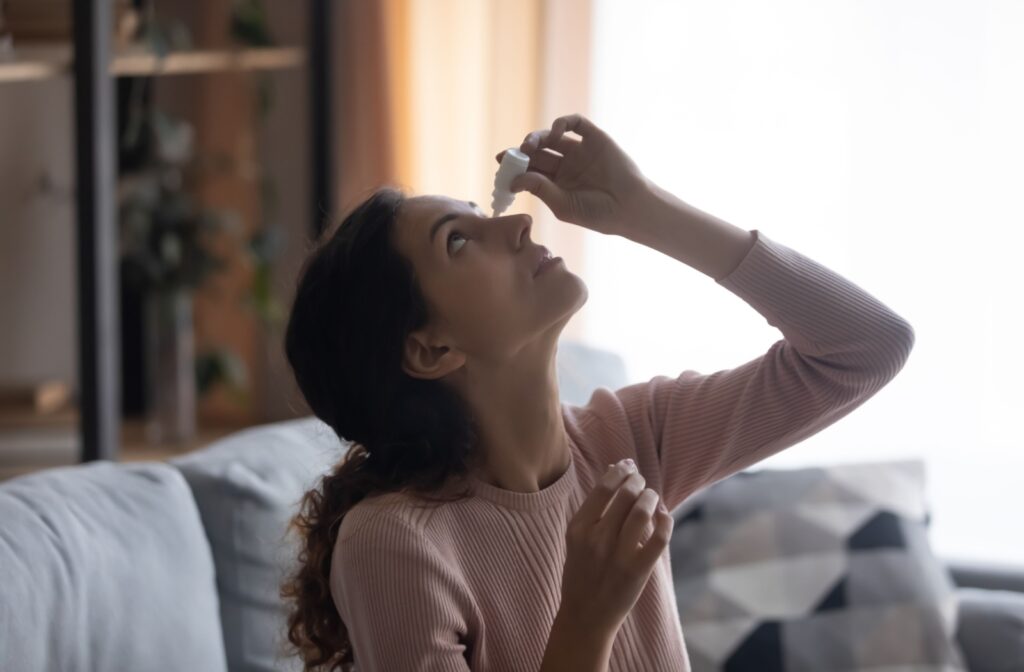
How to Find Relief from Dry Eyes
To find relief from dry eyes, a multi-angled approach is crucial. Through a combination of lifestyle changes, targeted in-office treatments, eye drops, and more, you can reduce your symptoms and address the underlying cause of your condition all at once.
Dry Eye Therapy
First, visit your optometrist to find out what’s causing your dry eyes. They can recommend in-office dry eye treatment options to target the root cause of your condition. Your optometrist can find a targeted approach that matches your specific needs to help you find relief.
Get Enough Sleep
Getting enough sleep is absolutely essential. Try to aim for 7-9 hours every night to give your eyes the rest they need. With a consistent bedtime routine, you can improve the quality and quantity of sleep you get.
Eye Drops
Sometimes, temporary relief is all you need. If this is the case, over-the-counter artificial tears can make all the difference in the world. Make sure you speak with your optometrist to get a bottle of drops that works for you, and only use them as recommended. Eye drops do expire!
Diet & Supplements
Your diet plays an important role in your overall eye health. Certain supplements like omega-3 fatty acids are key to a healthy tear film. These can be found naturally in fatty fish and nuts or in supplement form.
Don’t forget to eat a diet rich in:
- Leafy green vegetables like spinach and kale
- Citrus fruits such as oranges and lemons
- Carrots and sweet potatoes
- Bell peppers and broccoli
- Lean proteins
You should also make sure you’re staying hydrated by drinking enough water throughout the day. This can make a bigger difference than you might think!
Make Lifestyle Changes
Adjusting your daily habits can have a big impact on dry eye symptoms. Start by ensuring your environment is eye-friendly—if you use air conditioning or fans, try using a humidifier as well.
It also helps to:
- Avoid tobacco, as this worsens inflammation
- Wear sunglasses when outside to shield your eyes from wind and sunlight
- Maintain proper eyelid hygiene by gently cleaning your eyelids and eyelashes with a mild cleanser
With a few simple adjustments, you can create a more comfortable environment for your eyes and reduce your discomfort.
Can an Optometrist Treat Dry Eyes?
If you constantly wake up with dry eyes, it’s time to think about professional help. And our team here at Calgary Family Eye Doctors can help! Through a combination of specialty eye drops, in-office therapy, lifestyle changes, and more, we’ll work closely with you to find a solution.
We’re dedicated to helping you find relief from your dry eyes, so book an appointment with us today!
